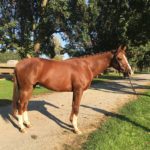When I was working on Chapter 7 (“Good Horsekeeping”) of The Smart Woman’s Guide to Midlife Horses, I met, interviewed, visited with and otherwise pestered a woman named Emily Kutz about the timeless question of how to make a successful transition from city to country living. Emily’s story really appealed to me because, like so many of us who finally get our horses later in life, the concept of making this drastic lifestyle change can be just plain scary. Scary enough, lots of times, that we talk ourselves out of doing it. So here’s the shot of encouragement I got from spending time with Emily. Not only is her place is absolutely beautiful ? a wonderful, well-thought-out reflection of her dream ? but she is someone who has had to learn everything she needed to know on the fly. And she did. She’s quick to say she’s very glad now that she “didn’t know what she didn’t know” when she took this plunge. And she’s equally quick to say she’s glad she did it. And now, years later, she couldn’t imagine living any other way. Did she have to learn it all at once? Of course not. She educated herself a little at a time, learning only what she needed to know, asking questions, hiring people to not only do the things she didn’t know how to do, but to also show her how to do it the next time. Most people, she told me, are more than willing to help you learn, even if that means you may not ?have to hire them when you get the know-how. And did she have to go out immediately and buy all kinds of heavy equipment she didn’t know how to operate or maintain? Nope. Another interesting thing Emily learned is that for every job that requires a special piece of equipment, there’s usually someone nearby who owns that piece of equipment and, time and logistics permitting, can be hired for a price to come and do what you need done, even as you watch and learn and ask a bazillion questions. Sure, you pay a little extra to get the guy down the road with the tractor to come plow your arena, and you probably won’t want to keep doing that forever, but when you don’t yet have a tractor and you don’t know how to drive one or plow anything, anyway, a little on-the-job training while the job gets done is a good use of your time and cash. Of course, you do have to find the guy with the tractor who is willing to do it for a reasonable price. Emily says you can also find these helpful folks by word of mouth or posting a notice at tfeel local feed store. And finally, Emily advises country newbies to make friends with the county agriculture extension hotline. These are the people who can tell you exactly what you need to know about taking care of pastures, hayfields, tanks, and pretty much any other flora and/or fauna question you may have. They’re also usually pretty great about connecting you with reliable resources you may be looking for in your area. Walking with Emily around her place, seeing the look of contentment on her face as she describes the work she’s done there, bit by bit, is inspiring. And it’s encouraging to know that yes, you can figure it out as you go. No it’s not going to be easy at first ? and more than likely not a bed of roses all the time ? ?but then, few worthwhile things ever are. Just remember: ?there are people out there pulling for you and wanting to help you succeed, if only you’ll ask. What are your transition to country living success stories? What did you learn on the fly by asking, watching and taking it all step by step? And thanks, buy the way, to all who have weighed in on the pro con conundrum! You have raised some excellent points and offered up some great tips and information. Keep it coming!








